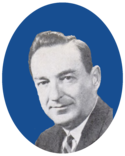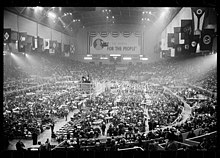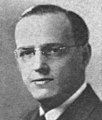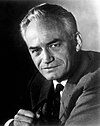1964 presidential election | |
  Nominees NomineesGoldwater and Miller | |
| Convention | |
|---|---|
| Date(s) | July 13–16, 1964 |
| City | Daly City, California |
| Venue | Cow Palace |
| Chair | Thruston Ballard Morton |
| Notable speakers | Richard M. Nixon Nelson Rockefeller |
| Candidates | |
| Presidential nominee | Barry Goldwater of Arizona |
| Vice-presidential nominee | William E. Miller of New York |
| Other candidates | Nelson Rockefeller William Scranton |
| Voting | |
| Total delegates | 1,308 |
| Votes needed for nomination | 655 |
| Results (president) | Goldwater (AZ): 883 (67.50%) Scranton (PA): 214 (16.36%) Rockefeller (NY): 114 (8.72%) |
| Results (vice president) | Miller (NY): 100% (Roll call) |
| Ballots | 1 |
| ‹ 1960 · 1968 › | |
The 1964 Republican National Convention took place in the Cow Palace, Daly City, California, from July 13 to July 16, 1964. Before 1964, there had been only one national Republican convention on the West Coast, the 1956 Republican National Convention, which also took place in the Cow Palace. Many believed that a convention in San Francisco indicated the rising power of the Republican Party in the west.
Political context
The Republican primaries of 1964 featured liberal Nelson Rockefeller of New York and conservative Barry Goldwater of Arizona as the two leading candidates. Shortly before the California primary, Rockefeller's wife, whom he had married the previous year after divorcing his first wife, gave birth. This event drew renewed attention to Rockefeller's family life, which hurt his popularity among conservatives. Rockefeller's divorce and remarriage were viewed by many observers as helping Goldwater win the primary. An anti-Goldwater organization called for the nomination of Governor William Scranton of Pennsylvania, but the effort failed. Although former President Dwight Eisenhower only reluctantly supported Goldwater after he won the nomination, former President Herbert Hoover gave him enthusiastic endorsement. By the end of the primaries, Goldwater's nomination was secure.
Senator Margaret Chase Smith's name was entered for nomination at the convention, the first time a woman's name was entered for nomination at a major party convention.
The convention
The Republican National Convention of 1964 was a tension-filled contest. Goldwater's conservatives were openly clashing with Rockefeller's moderates. Goldwater was regarded as the "conservatives' leading spokesman." As a result, Goldwater was not as popular with the moderates and liberals of the Republican Party. When Rockefeller attempted to deliver a speech, he was booed by the convention's conservative delegates, who regarded him as a member of the "eastern liberal establishment."

Former vice president and GOP presidential nominee (and future President) Richard Nixon introduced Goldwater as "Mr. Conservative" and "Mr. Republican" and continued that "he is the man who, after the greatest campaign in history, will be Mr. President — Barry Goldwater". 1964 was the only Republican convention between 1952 and 1972 that did not result in Nixon being nominated for president or vice-president.
The newly opened San Francisco Hilton served as the headquarters of the convention.
Platform

The 1964 Republican Platform was dominated by Goldwater conservatives, which meant the platform was dominated by calls for limited government, condemnations of the Kennedy and Johnson foreign and domestic policy, calls for more open space for free enterprise, a hard-line against Communist North Vietnam, calls for reform of the United Nations, a staunch support of NATO, calls for lower taxes, a hard line against international Communism, and an accusation that the Kennedy Administration was guilty of Munich-like appeasement for having opened a hotline with the Soviet Union and not with American allies.
Presidential nomination
Presidential candidates
-
 Senator
Senator
Barry Goldwater
of Arizona -
 Governor
Governor
William Scranton
of Pennsylvania -
 Governor
Governor
Nelson Rockefeller
of New York -
 Governor
Governor
George W. Romney
of Michigan -
 Senator
Senator
Margaret Chase Smith
of Maine -
 Former Representative
Former Representative
Walter Judd
of Minnesota -
 Senator
Senator
Hiram Fong
of Hawaii -
 Former Ambassador
Former Ambassador
Henry Cabot Lodge Jr.
of Massachusetts -
 Former Governor
Former Governor
Harold Stassen
of Minnesota
Despite political infighting, Goldwater was easily nominated on a revised first ballot. In his acceptance speech, Goldwater declared communism as a "principal disturber of the peace in the world today" and said, "I would remind you that extremism in the defense of liberty is no vice. And let me remind you also that moderation in the pursuit of justice is no virtue." Some people, including those within his own campaign staff, believed this weakened Goldwater's chances, as he effectively severed ties with the moderates and liberals of the Republican Party.
As delegates celebrated Goldwater's nomination, Republican officials attempted to clear reporters from the convention floor. NBC reporter John Chancellor refused to leave and was escorted from the convention by police officers, leading to his famous signoff, "This is John Chancellor, somewhere in custody!" According to Emmy award-winning television journalist, Belva Davis, she and another black reporter were chased out of the convention by attendees yelling racial slurs.
| States (1st ballot - before shifts) | Goldwater | Scranton | Rockefeller | Romney | Smith | Judd | Fong | Lodge |
|---|---|---|---|---|---|---|---|---|
| Alabama | 20 | |||||||
| Alaska | 8 | 2 | 1 | 1 | ||||
| Arizona | 16 | |||||||
| Arkansas | 9 | 2 | 1 | |||||
| California | 86 | |||||||
| Colorado | 15 | 3 | ||||||
| Connecticut | 4 | 12 | ||||||
| Delaware | 7 | 5 | ||||||
| Florida | 32 | 2 | ||||||
| Georgia | 22 | 2 | ||||||
| Hawaii | 4 | 4 | ||||||
| Idaho | 14 | |||||||
| Illinois | 56 | 2 | ||||||
| Indiana | 21 | |||||||
| Iowa | 14 | 10 | ||||||
| Kansas | 18 | 1 | 1 | |||||
| Kentucky | 21 | 3 | ||||||
| Louisiana | 20 | |||||||
| Maine | 14 | |||||||
| Maryland | 6 | 13 | 1 | |||||
| Massachusetts | 5 | 26 | 1 | 2 | ||||
| Michigan | 8 | 40 | ||||||
| Minnesota | 8 | 18 | ||||||
| Mississippi | 13 | |||||||
| Missouri | 23 | 1 | ||||||
| Montana | 14 | |||||||
| Nebraska | 16 | |||||||
| Nevada | 6 | |||||||
| New Hampshire | 14 | |||||||
| New Jersey | 20 | 20 | ||||||
| New Mexico | 14 | |||||||
| New York | 5 | 87 | ||||||
| North Carolina | 26 | |||||||
| North Dakota | 7 | 1 | 3 | 3 | ||||
| Ohio | 57 | 1 | ||||||
| Oklahoma | 22 | |||||||
| Oregon | 18 | |||||||
| Pennsylvania | 4 | 60 | ||||||
| Rhode Island | 3 | 11 | ||||||
| South Carolina | 16 | |||||||
| South Dakota | 12 | 2 | ||||||
| Tennessee | 28 | |||||||
| Texas | 56 | |||||||
| Utah | 14 | |||||||
| Vermont | 3 | 2 | 2 | 5 | ||||
| Virginia | 29 | 1 | ||||||
| Washington | 22 | 1 | 1 | |||||
| West Virginia | 10 | 2 | 2 | |||||
| Wisconsin | 30 | |||||||
| Wyoming | 12 | |||||||
| District of Columbia | 4 | 5 | ||||||
| Puerto Rico | 5 | |||||||
| U.S. Virgin Islands | 3 | |||||||
| Total | 883 | 214 | 114 | 41 | 27 | 22 | 5 | 2 |
| Presidential balloting | ||
|---|---|---|
| Candidate | 1st (before shifts) | 1st (after shifts) |
| Goldwater | 883 | 1,220 |
| Scranton | 214 | 50 |
| Rockefeller | 114 | 6 |
| Romney | 41 | 1 |
| Smith | 27 | 22 |
| Judd | 22 | 1 |
| Fong | 5 | 1 |
| Lodge | 2 | 0 |
| Not voting | 0 | 7 |
Presidential balloting / 3rd day of convention (July 15, 1964)
Vice presidential nomination
Vice presidential candidates
-
 Representative
Representative
William E. Miller
of New York -
 Representative
Representative
Gerald Ford
of Michigan -
 Governor
Governor
William Scranton
of Pennsylvania -
 Former Representative
Former Representative
Clare Boothe Luce
of Connecticut -
 Former Governor
Former Governor
John Davis Lodge
of Connecticut
William E. Miller, a representative from Western New York who had served as chairman of the Republican National Committee since 1961, was nominated unanimously on a roll call vote. Goldwater stated that he chose Miller to be his running mate simply because "he drives Johnson nuts" with his Republican activism. However, by some other accounts, Johnson "was barely aware of Miller's existence." Miller's Eastern roots and Catholic faith balanced the ticket in some ways, however ideologically he was conservative like Goldwater. His relative obscurity—"he was better known for snipes at President Kennedy than for anything else"—gave birth to the refrain "Here's a riddle, it's a killer / Who the hell is William Miller?"
He was replaced as Chairman of the RNC by Dean Burch, a Goldwater loyalist from Arizona.
| Vice presidential balloting | |
|---|---|
| Candidate | 1st |
| Miller | 1,305 |
| Abstained | 3 |
Vice presidential balloting / 4th day of convention (July 16, 1964)
See also
- History of the United States Republican Party
- List of Republican National Conventions
- United States presidential nominating convention
- 1964 Democratic National Convention
- 1964 United States presidential election
- Barry Goldwater 1964 presidential campaign
References
- Shadegg, Stephen (1965). What Happened to Goldwater? The Inside Story of the 1964 Republican Campaign. NY: Holt, Rinehart and Winston. p. 134. ISBN 9780878370115.
- ^ Davies, Lawrence E. (June 4, 1964). "Goldwater, Narrowly Beating Rockefeller, Sets California G.O.P. on a New Course". The New York Times. New York, NY. p. 22 – via TimesMachine.
- The New York Times Election Handbook 1964. New York: McGraw Hill. 1964. p. 65.
- Epstein, Leon D.; Ranney, Austin (1966). "Who Voted for Goldwater: The Wisconsin Case". Political Science Quarterly. 81 (1): 82–94 . doi:10.2307/2146862. JSTOR 2146862.
- Mattar, Edward Paul (1964). Barry Goldwater: A Political Indictment. Minneapolis: Century Twenty One Unlimited. pp. 84–7.
- Conservatives Re-Take the R... on YouTube
- Sawislak, Arnold (April 21, 1983). "Democrats chose San Francisco today as the site of..." UPI. Retrieved 3 February 2022.
- "Republican Party Platforms: Republican Party Platform of 1964". www.presidency.ucsb.edu. Retrieved 1 April 2018.
- White, Clifton F. (1967). Suite 3505: The Story of the Draft Goldwater Movement. New Rochelle: Arlington House. p. 15.
- ^ "1964: NBC reporter arrested on air". The Waterloo-Cedar Falls Courier. Waterloo, IA. August 17, 2020.
- Rutland, Ginger (February 19, 2012). "The Reading Rack". Sacramento Bee. p. E3. Archived from the original on February 1, 2013. Retrieved November 14, 2012.
- ^ Perlstein, Rick (2002). Before the Storm: Barry Goldwater and the Unmaking of the American Consensus. PublicAffairs. p. 389. ISBN 9780786744152 – via Google Books.
External links
- Republican Party platform of 1964 at The American Presidency Project
- Goldwater nomination acceptance speech for President at RNC (transcript) at The American Presidency Project
- 1964 Republican National Convention at Smithsonian Magazine
- Video of Goldwater nomination acceptance speech for President at RNC from C-SPAN (via YouTube) Archived 2016-11-07 at the Wayback Machine
- Audio of Goldwater nomination acceptance speech for President at RNC
| Preceded by 1960 Chicago, Illinois |
Republican National Conventions | Succeeded by 1968 Miami Beach, Florida |
| (← 1960) 1964 United States presidential election (→ 1968) | |||||||||||||||
|---|---|---|---|---|---|---|---|---|---|---|---|---|---|---|---|
| Democratic Party |
| ||||||||||||||
| Republican Party |
| ||||||||||||||
| |||||||||||||||
| |||||||||||||||
| Barry Goldwater | ||
|---|---|---|
| Political career |  | |
| Elections | ||
| Family |
| |
| Other | ||
- 1964 conferences
- 1964 in California
- 1964 United States presidential election
- Events of the civil rights movement
- July 1964 events in the United States
- Political conventions in California
- Political events in the San Francisco Bay Area
- Republican National Conventions
- Republican Party (United States) events in California
- Barry Goldwater
- Events in Daly City, California
- 1960s political conferences
- Nelson Rockefeller
- George W. Romney


